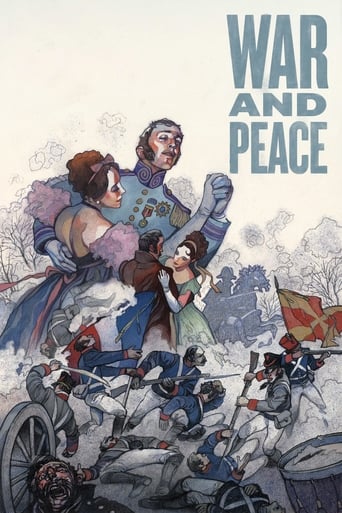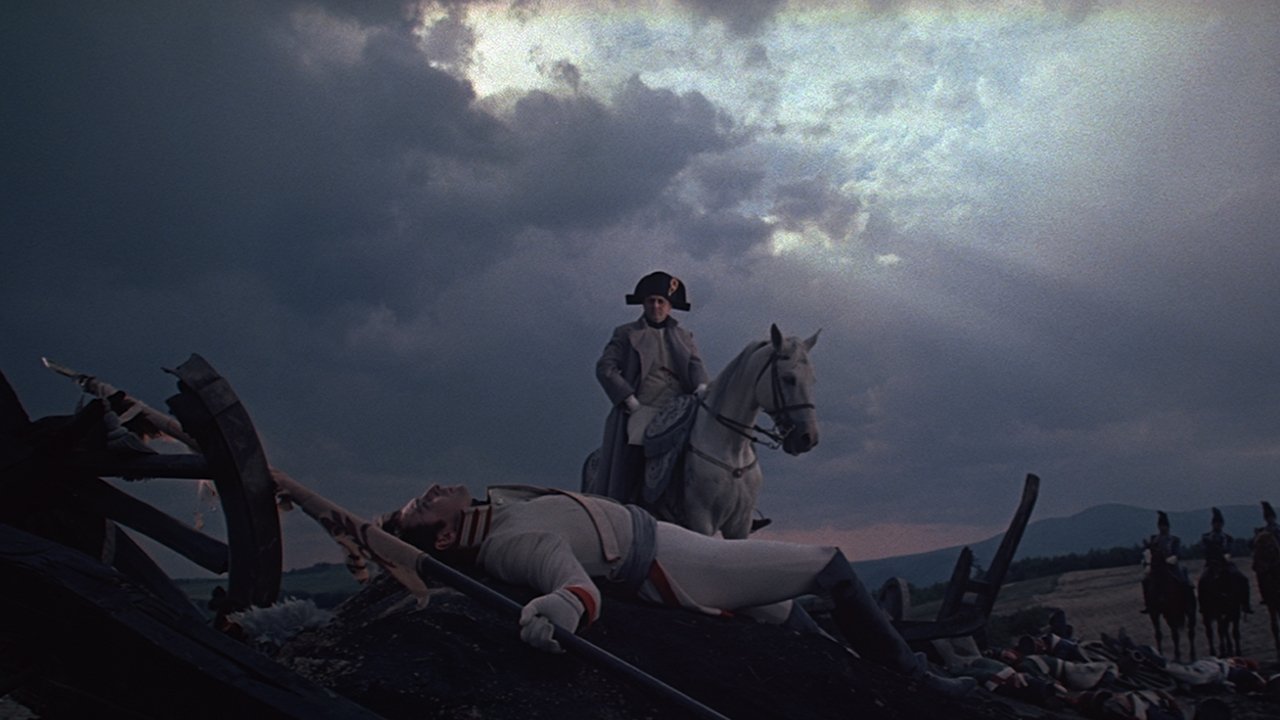chengiz
War and Peace the novel is so long its length has entered popular culture. So a four part, seven plus hour movie adaptation of it makes sense. But not if you're gonna devote a quarter of it to just one battle. I don't know if the Communist party was responsible for the third part, but it just drags. Yes, it's very real, and I love realism in a movie, but realism is not *sufficient*. The battle sounds superb on paper, certainly *looks* like the costliest battle ever shot, but it's a poorly directed, boring, overlong, confusing mess. The first two parts of this movie were very good: the balls, the duel, some of the soliloquies (the one where Andrei's first wife dies got to me), the scene where Rostova dances in the caretaker's place (also the best scene in the book, by the way). Yes, it's a little dated - everyone seems to act too much with their faces, and the voiceovers tend to be a tad much at times - but it's par for the course. What I minded was the third part bringing this movie down. It recovers somewhat during the fourth, but you realize it's no longer a masterpiece as you'd formerly hoped. Also, Bezukhov (Bondarchuk himself, sadly) is too old and too fat.
TheLittleSongbird
This Russian version is not going to appeal to everybody, it is incredibly long to the extent that viewing the whole film in one sitting is unlikely to happen for most and non-Russian speakers who are not familiar with the story will find themselves confused as to what's going on. For this viewer though, apart from some over-histrionic acting in places including from Sergei Bondarchuk's Pierre, the film was a towering achievement and the best version of Tolstoy's masterpiece alongside the 1972 mini-series.War and Peace (1966) is a visual stunner, the scenery and period detail is spectacular and gives a sense of time and place far better than any other version of War and Peace and the cinematography is inventive and enough to take the breath away. The film and visuals especially stood out in the ballroom scenes, which were gorgeously romantic and on par with those of Visconti's The Leopard, and in the enormous in scope and incredibly gut-wrenching battle scenes, aided even further by the chilling music score. The duel is similarly unforgettable and is quite heart-wrenching. The music was another asset that worked phenomenally, the mix of songs, marches, chants and waltzes made for not only music that was emotionally powerful and beautiful to listen to but also gave a sense that the story was set in Russia in the way that few of the other versions managed to achieve, even Nino Rota's truly excellent score for the 1956 film. The music score fits amazingly and is a large part as to why the battle scenes are so memorable.The script is rich in detail, thoughtful and mostly true to Tolstoy's style (if lacking though in the savage satirical bite that Tolstoy sometimes adopts, making the tone a touch sullen), though those unfamiliar with the story or the Russian language are likely to find themselves easily themselves, especially with the English-edited dubbed version being as poorly done as it is. The story makes the most of its length, so that the nearly seven hour length doesn't feel overlong (which it was never going to be, War and Peace needs a long length to do the story justice). Fans of the book will be thrilled to find as many of the key scenes, themes and characters kept intact as much as possible and with the full impact they should do, the film wisely doesn't spend too long on the human drama scenes and paces them tightly, giving them genuine poignancy. Characters are compellingly real, even potential caricatures such as Napoleon and Kutuzov, and Bondarchuk's direction is remarkable, his task was monumental and he succeeded in making it completely fascinating. And despite what I said before about the acting, most of it works fine with a lot of living the drama in alternative to just acting it.In conclusion, one of the best versions of War and Peace and a flawed but towering achievement. 9/10 Bethany Cox
Robert J. Maxwell
I tried to tackle Tolstoy's "War and Peace." I'd read "Anna Karenina" as a teen and found it interesting. And I positively enjoyed "Crime and Punishment" later in life -- an AXE MURDER! But "War and Peace" was simply too big. Natasha is a doll-like figure resembling Audrey Hepburn, with her long neck, slender figure, wide eyes, and fragile features. She's elfin with a touch of the Tatar brush. She looks as if you could take one of her long bones and snap it like a twig. Only her lips are plumper than Hepburn's, suggesting she is prepared to be debauched more thoroughly than Audrey Hepburn ever was.Still, she looks like an adolescent throughout, and has an adolescent's impatient, flighty notion of love. She pines for Prince Andre and he finally proposes, but there is no formal engagement, and he tells her he will spend a year away to give her time to think. She thinks. Then she leaps headlong into a glandular love with some already-married Schmuck who tries to sweep her away and ruin her. She's eager but her family prevents it. The Battle of Borodino, a Russian victory that didn't save Moscow, is long, action filled, gory, smoky, hard on horses, and confusing. Half the time I couldn't tell who was who. Andre is in the midst of the fighting, and Pierre is covered with mud while observing, but it was possible to identify the French in long shots only because their headgear had a kind of plume sticking straight up, and in close ups their blue blouses could be clearly seen. I said that it's hard on horses because of the obvious use of a device called the "running W". Wires were attached to the horse's front legs and the horse was made to gallop until the wire ran out to its full length, yanking the horse's legs out from under him.It's extremely impressive. At any given time there may be literally hundreds of soldiers galloping, marching, or running across the screen amid the racket and puffs of exploding shells, often in aerial shots. But it's impossible to follow the developments. It's all done by editing or montage, rather than from a particular individual's point of view. I'd contrast it with a much briefer and equally effective, studio-bound scene of combat from "Pride of the Marines." In some ways the most harrowing scenes are those of executions, not battles. We get to know a little about the people being tied helplessly to the stake, blindfolded, and shot. In battle you can defend yourself, but this is murder. Bondarchuk, the director, has given himself the part of Pierre, a nice sympathetic role, but he doesn't try to become a matinée idol. How could he? He looks like James Coco. He has a fine scene in which he has a duel with some smart aleck and almost by accident shoots the fellow in the ribs, after which, filled with guilt, he runs drunkenly through the snowy woods, stumbling over everything.The night before Borodino, Andre and Pierre have a chat in Andre's dark cabin. Andre is full of misgivings about tomorrow, certain he will be killed. And he rhetorically asks some simple questions. Tomorrow hundreds of thousands of men will try to butcher one another and he, Andre, will be among the most enthusiastic. The side that kills the most will be the winner. But everyone, soldier and civilian alike, will suffer. If God is good, how can He allow all this crap to continue? It's a conundrum that has no satisfactory answer although most world religions have been at pains to find one. Christianity decided that God gave man free will as a kind of test. He can create evil if he likes. In other Eastern religions, suffering is working off some bad karma leading to redemption in the next life. But Andre never answers his own question. He's just perplexed by it all.A lusty theme of nationalism runs through the film. The narration tells us about the role of the Russian spirit in turning Napoleon away from Moscow. It's believable enough. In what the Russians call "The Great Patriotic War" and we call "World War II", it's doubtful that many involved were fighting for Josef Stalin. I found the narration a bit much, rather like Basil Rathbone's patriotic platitudes at the end of his Sherlock Holmes movies. But there is a warm little scene at the time of the wolf hunt. In a humble wooden cottage, after a simple meal, a servant in the next room is playing a balalaika and the patriarch at the table takes up his guitar and begins to play an unpretentious ballad. He begs Natasha to dance and she holds her skirt wide and glides from place to place with tiny graceful movements. The tempo picks up and she spins madly and joyously. Afterward the old man applauds and wonders how -- what with her French nanny and her cosmopolitanism -- Natasha could still be so aglow with Russianism. The later part of the film gets all spiritual, as Tolstoy himself did.Its most pronounced attribute is its length. It's a longie. It goes on and on and on. It's like driving through Texas. And it still fails to cover all the text. There's nothing about Pierre's experimentation with the Masons, for instance. I don't know what it was about the Napoleonic wars but Russian General Bagration, who became a hero at the Battle of Austerlitz, had a salad named after him. No kidding. You can look up the recipe easily. And then, of course, Napoleon is a creamy pastry and Beef Wellington is roasted in a pastry shell. Something about food and the French, I expect. A Gallic influence seems to be everywhere. And now, please excuse me as I warm my baguette over the bidet.
aerovian
This is not a commentary on the actual movie, but on the RUSCICO DVD release for North America. I don't know if there have been different releases and updates, but the disks we rented had a 2000 copyright on them, if that means anything. Anyway, the sound mixing on these DVD's was absolutely horrible. The levels often yo-yo-ed up and down; when the scene cut to a battlefield panorama, the orchestral track would thunder so loudly that I didn't know which would blow out first -- my eardrums or my speakers. When it was time for dialog, the volume would usually drop to something barely audible. Occasionally, the orchestra and Foley-work would stay loud while the dialog was superimposed at a much lesser level. My wife and I found that the only way we could watch this movie at all from these DVD's was if one of us kept a hand on the remote to continuously modulate the volume. And, like another user has already commented, when we selected English audio the dialog kept switching back and forth between Russian and English; and occasionally when the characters spoke in French on the native track the dubbing was in Russian, so you're SOL if you understand neither. Ultimately, we gave up watching after the first disk. Before you fork out $50+ for this movie on DVD for your own library, I'd heartily recommend getting your hands on a rental copy to see whether you can really enjoy this epic flick when burdened by such bad sound, particularly if you've never read the book and really want to understand the storyline.


 AD
AD



